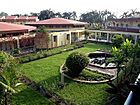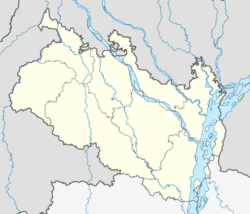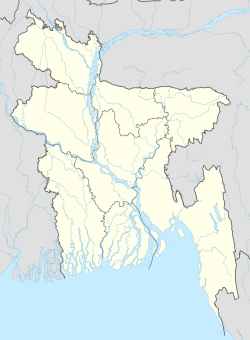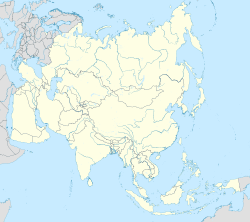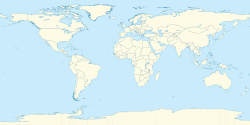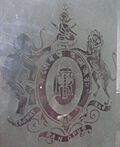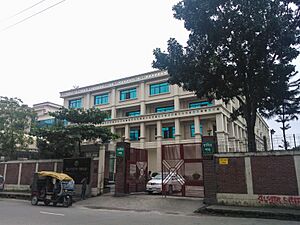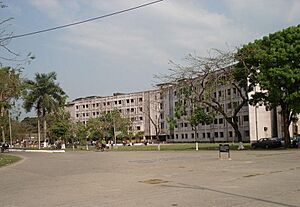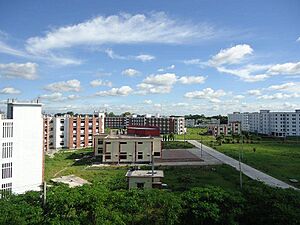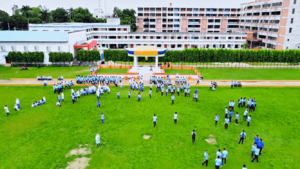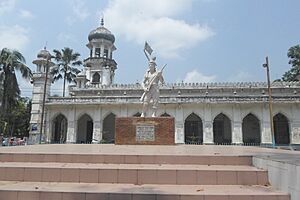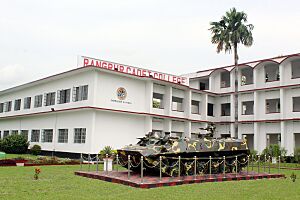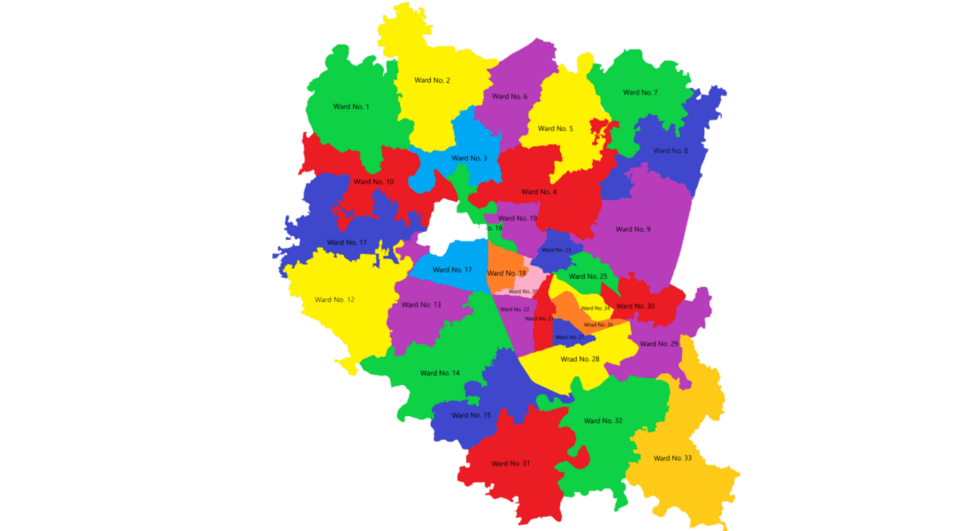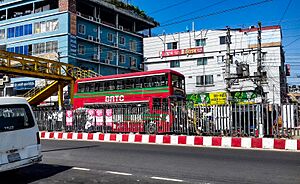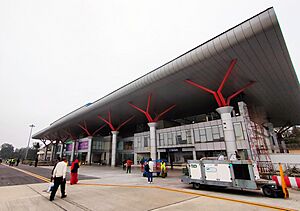Rangpur, Bangladesh facts for kids
Quick facts for kids
Rangpur City
রংপুর শহর
|
|
|---|---|
|
Metropolis
|
|
|
Tajhat Palace
Rangpur Town Hall
Begum Rokeya University
Parjaton Motel
Keramotia Mosque
Terminal Mosque
Zilla Parishad
|
|
| Nickname(s):
Green City, Education City, City of Colours
|
|
| Country | |
| Division | Rangpur Division |
| District | Rangpur District |
| Establishment | 1575 (During the Mughal Empire) |
| Municipality | 1 May 1869 |
| City Corporation | 28 June 2012 |
| Metropolitan City | 16 September 2018 |
| Government | |
| • Type | Mayor–Council |
| • Body | Rangpur City Corporation |
| Area | |
| • Urban | 205 km2 (79 sq mi) |
| • Metro | 239.72 km2 (92.56 sq mi) |
| Area rank | 2nd largest City Corporation in Bangladesh |
| Elevation | 34 m (111.549 ft) |
| Population
(2022)
|
|
| • Rank | 5th in Bangladesh |
| • Urban | 1,031,388 |
| • Urban density | 3,871/km2 (10,030/sq mi) |
| • Metro | 1,450,128 |
| • Metro density | 4,167/km2 (10,790/sq mi) |
| Demonym(s) |
|
| Languages | |
| • Official | Bengali • English |
| Time zone | UTC+06:00 (BST) |
| Postal code |
5400
|
| National calling code | +088 |
| Police | Rangpur Metropolitan Police |
| Calling code | 521 |
| Police | Rangpur Metropolitan Police |
| Airport | Saidpur Airport |
| National Highway | |
| Cricket Team |
|
| UN/LOCODE | BD RAU |
Rangpur City is a big city in northern Bangladesh. It is the main administrative center of the Rangpur Division. The city is located by the Ghaghot River and close to the Teesta River. Rangpur is the second largest City Corporation in Bangladesh.
The city has grown a lot recently. Its roads and services have improved, making it an important regional hub. Many students come to Rangpur for good education. The city also has a lively local culture with traditional festivals.
Rangpur was taken over by a general of the Mughal Emperor Akbar in 1575. By 1686, it became a full part of the Mughal Empire. In 1769, Rangpur was made a District Seat. In 1869, it became one of the oldest municipalities in the country. The municipal office building was built in 1892.
The larger Rangpur district was divided into five smaller districts in 1984. These new districts were Gaibandha, Kurigram, Lalmonirhat, Nilphamari, and Rangpur.
Contents
History of Rangpur City
How Rangpur Got Its Name
The name Rangpur likely comes from "Rongpur." Long ago, British rulers grew indigo here. Indigo was called "Rongo" by local people. Because the soil was good for indigo, the area was called "Rongopur." This name later became Rangpur.
Another idea is that Rangpur comes from "Rangmahal," which means "Palace of Entertainment." This palace belonged to Bhagadatta, a king from the ancient Pragjyotisha Kingdom.
Early Days of Rangpur
According to old stories, the Rangpur area was part of the eastern kingdom of Kamarupa. This kingdom was also known as Pragjyotisha. During the time of King Bhagadatta (around 15th century BC), Rangpur was part of his kingdom. Later, around 340 AD, Rangpur was a "Tax state" of Kamarupa.
Rangpur During Mughal Rule
In 1575, Raja Man Singh, a commander for the Mughal emperor Akbar, conquered Rangpur. However, it took until 1686 for Rangpur to be fully part of the Mughal Empire. The Mughal Empire was established across all of Rangpur by 1611 AD. Place names like Mughalbasa (meaning "a place of the Mughals") and Mughalhat (meaning "local market") show the Mughal connection to Rangpur.
Rangpur Under British Rule
The East India Company took control of Rangpur in 1765. This was when British rule began. The Fakir-Sannyasi rebellion happened in Rangpur. Leaders like Fakir Majnu Shah were important in this uprising. Brave anti-colonial rebels like Devi Chaudhurani also came from this area.
In the Sepoy Mutiny of 1857, rebellious soldiers caused fear among the British. Later, in 1930, the first Civil disobedience movement started in Rangpur. This was in response to a call from the Congress party. A meeting of farmer leaders was held here in October 1946. This led to the Tebhaga movement starting in November.
Rangpur in Pakistani Period and Liberation War
During the Pakistani Period, Rangpur was a district of East Pakistan. People in Rangpur actively joined many movements. These included the Bengali language movement and the 1969 Mass uprising. Sangku Samajhder was the first person from Rangpur to die in the liberation war. He was killed on March 3, 1971.
Rangpur people bravely started the Bangladesh Liberation War on March 28, 1971. They attacked the Rangpur Cantonment just three days after the Pakistani crackdown. During the war, Rangpur was part of Sector 6. It was important because it was close to the border of India.
Rangpur After Independence
In 1984, the larger Rangpur district was divided into five smaller districts. On June 28, 2012, Rangpur Municipality became the Rangpur City Corporation. Then, on September 16, 2018, Rangpur was named the 8th Metropolitan city of Bangladesh.
Geography of Rangpur
Rangpur City is the main city of Rangpur Division. The soil here is mostly alluvial soil, which is rich soil from the Teesta River. The city is 34 meters above sea level. Temperatures range from 11 to 32 degrees Celsius. The city gets about 2931 mm of rain each year. Rangpur city covers about 42 square kilometers. It is located on the Ghaghat River.
Climate in Rangpur
Rangpur has a humid subtropical climate. This means it has hot, wet summers and mild, dry winters. The year has four main seasons.
First, there is a summer or pre-monsoon season (March–May). It has high temperatures and strong thunderstorms called Nor'westers. Next is a very wet Monsoon season (June–September). This season brings a lot of rain and can cause floods in low areas. Then comes a short, cooler Autumn season (October–November). Finally, there is a pleasant, mild, and drier Winter season (December–February). Winters have warm afternoons and cool mornings. Night temperatures can sometimes drop below 5 degrees Celsius.
The average yearly temperature in Rangpur is about 24.9°C. Most of the 2192 mm of rain falls during the monsoon season. Very little rain falls from November to March. However, some rain can happen due to weather systems from the Mediterranean Sea. It rarely snows or frosts in Rangpur.
| Month | Jan | Feb | Mar | Apr | May | Jun | Jul | Aug | Sep | Oct | Nov | Dec | Year |
|---|---|---|---|---|---|---|---|---|---|---|---|---|---|
| Record high °C (°F) | 29.4 (84.9) |
34.4 (93.9) |
43.3 (109.9) |
42.5 (108.5) |
41.2 (106.2) |
38.2 (100.8) |
38.4 (101.1) |
39.8 (103.6) |
38.0 (100.4) |
37.2 (99.0) |
33.4 (92.1) |
30.6 (87.1) |
43.3 (109.9) |
| Mean daily maximum °C (°F) | 22.8 (73.0) |
26.4 (79.5) |
30.3 (86.5) |
31.5 (88.7) |
31.9 (89.4) |
32.1 (89.8) |
32.1 (89.8) |
32.5 (90.5) |
31.9 (89.4) |
31.0 (87.8) |
28.7 (83.7) |
25.0 (77.0) |
29.7 (85.5) |
| Daily mean °C (°F) | 16.1 (61.0) |
19.5 (67.1) |
23.7 (74.7) |
26.2 (79.2) |
27.5 (81.5) |
28.5 (83.3) |
28.9 (84.0) |
29.1 (84.4) |
28.3 (82.9) |
26.5 (79.7) |
22.5 (72.5) |
18.3 (64.9) |
24.6 (76.3) |
| Mean daily minimum °C (°F) | 10.9 (51.6) |
13.7 (56.7) |
17.6 (63.7) |
21.3 (70.3) |
23.4 (74.1) |
25.3 (77.5) |
26.2 (79.2) |
26.3 (79.3) |
25.5 (77.9) |
22.9 (73.2) |
17.7 (63.9) |
13.3 (55.9) |
20.3 (68.5) |
| Record low °C (°F) | 3.5 (38.3) |
3.7 (38.7) |
8.6 (47.5) |
14.7 (58.5) |
16.4 (61.5) |
19.4 (66.9) |
21.1 (70.0) |
20.7 (69.3) |
19.1 (66.4) |
14.2 (57.6) |
10.1 (50.2) |
5.2 (41.4) |
3.5 (38.3) |
| Average precipitation mm (inches) | 9 (0.4) |
10 (0.4) |
27 (1.1) |
121 (4.8) |
277 (10.9) |
426 (16.8) |
416 (16.4) |
343 (13.5) |
382 (15.0) |
171 (6.7) |
6 (0.2) |
4 (0.2) |
2,192 (86.4) |
| Average precipitation days (≥ 1 mm) | 1 | 2 | 3 | 8 | 15 | 19 | 19 | 17 | 15 | 7 | 1 | 1 | 108 |
| Average relative humidity (%) | 82 | 75 | 68 | 74 | 81 | 85 | 86 | 85 | 87 | 84 | 80 | 81 | 81 |
| Mean monthly sunshine hours | 184.6 | 206.9 | 239.3 | 210.0 | 199.4 | 150.2 | 154.9 | 172.0 | 165.5 | 227.8 | 236.6 | 214.8 | 2,362 |
| Source 1: NOAA | |||||||||||||
| Source 2: Bangladesh Meteorological Department (humidity 1981-2010) | |||||||||||||
Economy and Business in Rangpur
Rangpur is a major business center. Its downtown area has many government offices and private banks. There are also insurance companies, hotels, and international restaurants. You can find Chinese, Thai, Indian, and Mexican food here.
Rangpur is an important economic zone in Bangladesh. This is because of its location. It is also a main area for growing tobacco in Bangladesh. Large tobacco companies like British American Tobacco have offices in the northern parts of Rangpur.
People and Population of Rangpur
| Historical population | ||
|---|---|---|
| Year | Pop. | ±% |
| 1950 | 34,000 | — |
| 1960 | 44,000 | +29.4% |
| 1970 | 68,000 | +54.5% |
| 1980 | 134,000 | +97.1% |
| 1991 | 191,398 | +42.8% |
| 2001 | 241,310 | +26.1% |
| 2011 | 300,659 | +24.6% |
| 2022 | 708,534 | +135.7% |
| Source: popstat,pre-1991,citypopulation.de after 1991,2022 census | ||
| Religions in Rangpur (2011) | ||||
|---|---|---|---|---|
| Religion | Percent | |||
| Islam | 92.66% | |||
| Hinduism | 7.19% | |||
| Other or not stated | 0.15% | |||
In 2022, Rangpur city had a population of 708,534 people. About 80.94% of the people could read and write.
In 2011, Rangpur city had 300,659 people living in 64,885 homes. About 17.23% of the population was under 10 years old. The literacy rate for people aged 7 and over was 72.08%. This was higher than the national average of 51.8%.
Education in Rangpur
Rangpur has many important schools, colleges, and universities.
Universities in Rangpur
- Begum Rokeya University, Rangpur
Medical and Dental Colleges
- Rangpur Medical College
- Prime Medical College
- Rangpur Community Medical College
- Northern Private Medical College
- Rangpur Army Medical College
- Kasir Uddin Memorial Medical College
- Rangpur Dental College
Schools in Rangpur
- Cantonment Public School And College, Rangpur
- Rangpur Zilla School
- Police Lines School and College, Rangpur
- Rangpur Govt. Girls' High School
- Lions School and College, Rangpur
- Collectorate School and College, Rangpur
- Rangpur High School
Colleges in Rangpur
- Carmichael College
- Rangpur Cadet College
- Police Lines School and College, Rangpur

- Cantonment Public School And College, Rangpur
- The Millennium Stars School & College
- BIAM Model School And College, Rangpur
- Rangpur Government College
- Begum Rokeya College
- Rangpur Engineering College
- Dr M A Wazed Miah Textile Engineering College
- Rangpur Marine Academy
- Collectorate School and College
- Carmichael Collegiate School and College
- Rangpur Technical School and College
- Rangpur Model College
- RCCI Public School & College
- Lions School & College
- Somaj Kolyan Women School & College
- Residential Model School and College
- Rangpur Public School and College
- Rangpur City College
- Siddique Memorial School & College
- Dhap Lalkuthi High School & College
English Medium Schools
- The Millennium Stars School & College
- International Grammar School
- BIAM Laboratory School
- Shahan International School
- Nalanda International School
Polytechnic Institutes
- Rangpur Polytechnic Institute
- Rangpur Technical School and College
Neighborhoods of Rangpur
Rangpur City Corporation has 33 wards and many neighborhoods. These areas are both urban (city) and suburban (outskirts).
- Burirhat
- Chabbis Hazari
- Panadardighi
- Uttam
- Hazirhat
- CO Bazar
- Dhap
- Kellabond
- Radhaballov
- Shimulbag-Sagarpara
- Keranipara
- Munshipara
- Lalkuthi lane
- Khalifapara
- Jummapara
- Jahaj Company
- Nababgonj
- Betpotti-Taltola
- Kotkipara
- Parjantan Para
- Modern
- Ashratpur
- Alamnagar
- Robertsonganj
- Darshana
- Lalbagh
- Khamarpara
- Islampur
- Pirjabad
- Parbatipur
- Mahiganj
- Tajhat
- Ganeshpur
- Babukha
- DC More
- Adarshapara
- Mistry Para
Transportation in Rangpur
Road Travel
Rangpur is well connected by highways to other major cities like Chittagong and Dhaka. It takes about 6 to 7 hours to reach Dhaka by road using National Highway 5. Bus services are also available to other districts. Roads also connect to India through the Asian Highway 2. Rangpur has a BRTC Double Decker bus service. This service connects the city center to its outer areas.
Train Travel
The Rangpur Railway Station is the main train station. It offers national train routes run by Bangladesh Railway. The Rangpur Express is a train that runs between Rangpur and Dhaka. Other trains connecting Rangpur and Dhaka are the Kurigram Express and Lalmoni Express.
Air Travel
Rangpur city is served by Saidpur Airport. This airport is located north of the city. Saidpur Airport is a domestic airport. Several airlines, like Novoair, US-Bangla Airlines, Regent Airways, and Biman Bangladesh Airlines, fly from here. There are big plans to make Saidpur Airport an international airport for northern Bangladesh.
Sports in Rangpur
Cricket is the most popular sport in Rangpur. Football, field hockey, basketball, baseball, and tennis are also enjoyed.
Rangpur has a 10,000-seat Rangpur Stadium. This stadium is used for football and other sports. Another local stadium is Cricket Garden, mainly used for cricket. There are also sports training academies in the city.
In Twenty20 cricket, Rangpur has a team called Rangpur Riders. They play in the Bangladesh Premier League. Famous players from Rangpur who have played for the national team include Nasir Hossain and Suhrawadi Shuvo.
Notable People from Rangpur
Leaders and Officials
- Abu Sadat Mohammad Sayem: 6th President of Bangladesh and 1st Chief Justice of Bangladesh.
- Hussain Muhammad Ershad: Former President of Bangladesh.
- Shah Abdul Hamid: 1st Speaker of the Parliament of Bangladesh.
- Abu Hussain Sarkar: 4th Chief Minister of East Pakistan.
- Hassan Mahmood Khandker: Longest-serving Inspector General of Bangladesh Police.
- Tipu Munshi: Minister of Commerce of Bangladesh.
Artists and Performers
- Asaduzzaman Noor: Actor, politician, and activist.
- Abbasuddin Ahmed: Famous folk and Ghazal singer.
- Ferdausi Rahman: Legendary folk and playback singer.
Writers and Journalists
- Anisul Hoque: Author, novelist, and journalist.
- Rashid Askari: Academic, writer, and former vice-chancellor.
- Monajatuddin: Journalist.
Historical Figures and Activists
- Begum Rokeya Shakhawat Hossain: Famous for her work on gender equality and social issues.
- Prafulla Chaki: British Indian revolutionary.
- Abu Sayed: Student activist.
Scientists and Scholars
- M. A. Wazed Miah: Reputed Bangladeshi nuclear scientist.
Sports Stars
- Nasir Hossain: All-round cricketer.
- Akbar Ali: World Cup winning captain of Bangladesh under-19 cricket team.
- Mishrat Jahan Moushumi: Women's footballer.
- Sirat Jahan Shopna: Women's footballer.
Images for kids
See also
 In Spanish: Rangpur para niños
In Spanish: Rangpur para niños
 | Jessica Watkins |
 | Robert Henry Lawrence Jr. |
 | Mae Jemison |
 | Sian Proctor |
 | Guion Bluford |






